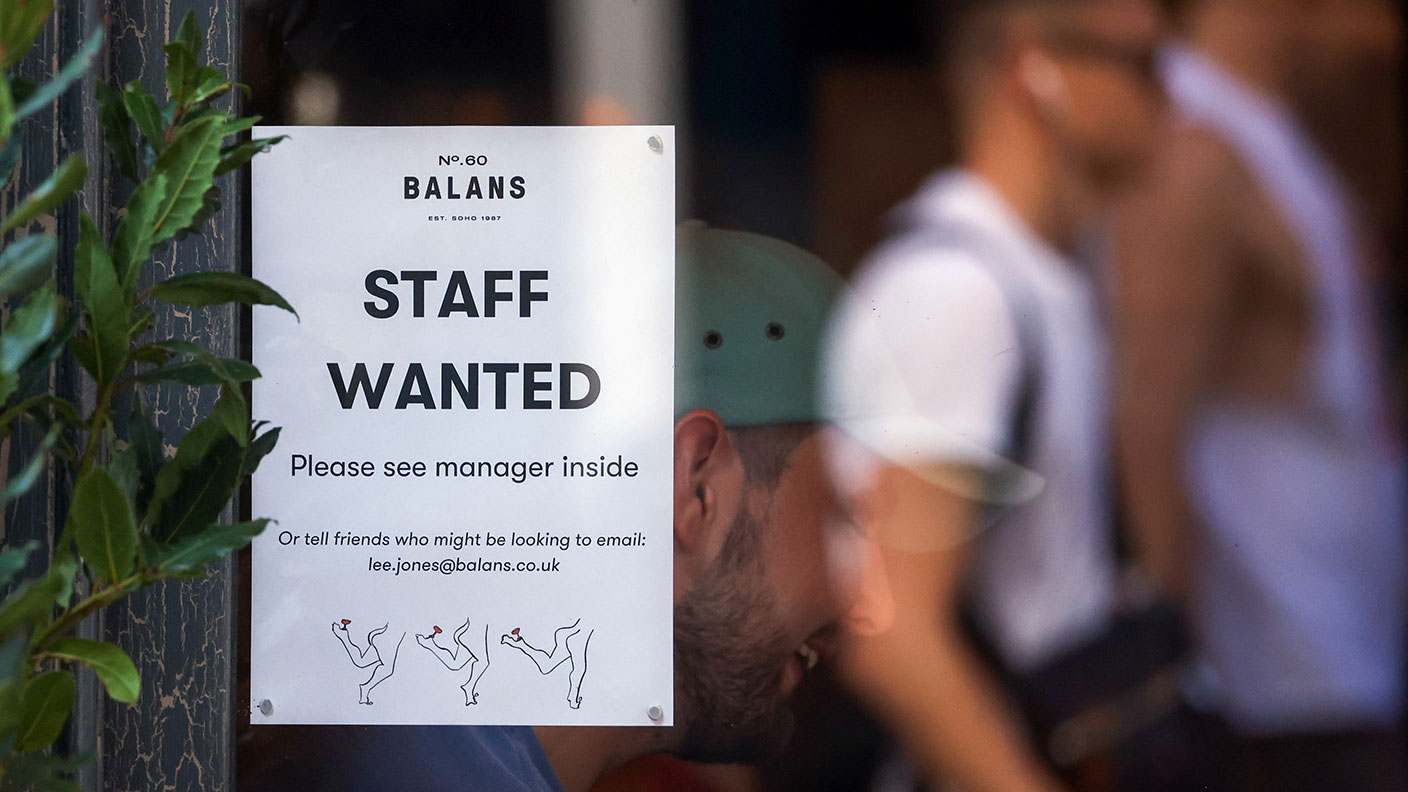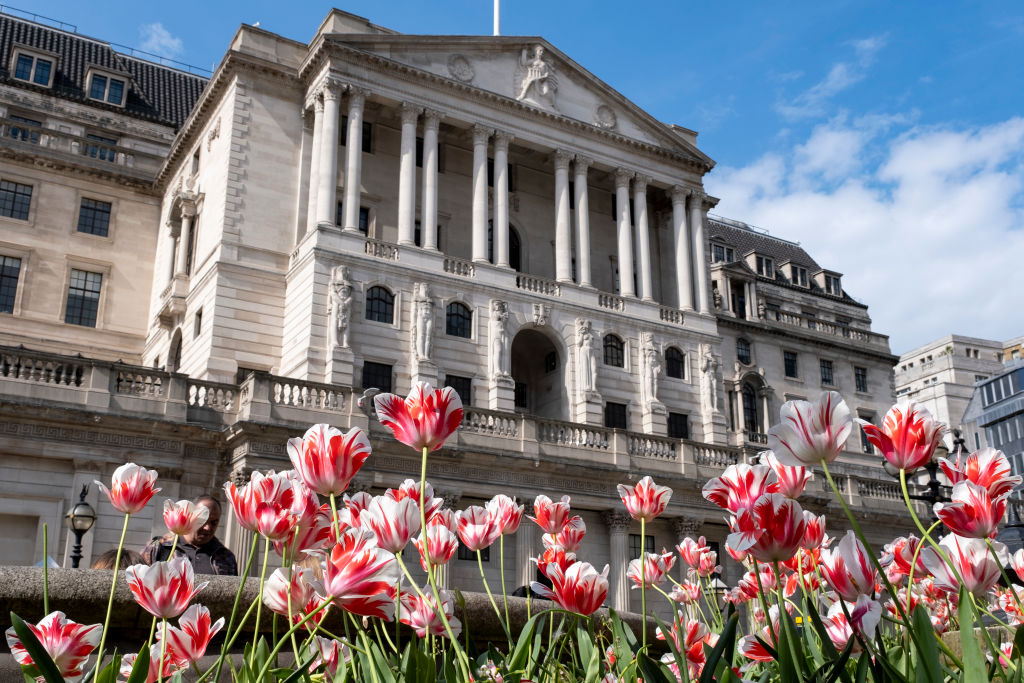The UK jobs market is still red hot – but will it last?
For the first time ever, there are more job vacancies than people to fill them, and wages are rising at a decent clip. But that might just be a temporary thing, says John Stepek. Here’s why.


Get the latest financial news, insights and expert analysis from our award-winning MoneyWeek team, to help you understand what really matters when it comes to your finances.
You are now subscribed
Your newsletter sign-up was successful
Want to add more newsletters?

Twice daily
MoneyWeek
Get the latest financial news, insights and expert analysis from our award-winning MoneyWeek team, to help you understand what really matters when it comes to your finances.

Four times a week
Look After My Bills
Sign up to our free money-saving newsletter, filled with the latest news and expert advice to help you find the best tips and deals for managing your bills. Start saving today!
The UK jobs market is blazing hot.
That might explain why the Bank of England appears unable to hire a PR person to advise our current gaffe-prone governor.
Some PR advice for the Bank of England boss
Bank of England governor Andrew Bailey was being cross-examined at the Treasury Select Committee yesterday. He got a pretty easy ride given that inflation is running at nearly five times the Bank of England target of 2%.
MoneyWeek
Subscribe to MoneyWeek today and get your first six magazine issues absolutely FREE

Sign up to Money Morning
Don't miss the latest investment and personal finances news, market analysis, plus money-saving tips with our free twice-daily newsletter
Don't miss the latest investment and personal finances news, market analysis, plus money-saving tips with our free twice-daily newsletter
But he still managed to blunder into the same old elephant trap about wages.
A few months ago, Bailey made the mistake of saying that workers should show restraint in the annual wage-bargaining process. Everyone immediately jumped down his throat and pointed out that he was on half-a-million-odd pounds (a little bit of a non-sequitur, but you can see the point).
He then ran out to try to salvage things by pointing out that companies should think about how they raise prices as well.
But today’s papers are again full of somewhat disingenuous headlines about Bailey saying that workers should “think and reflect” before asking for pay rises. Never mind that he attempted to limit it to “people on higher earnings”. Yet again, he’s being lambasted for it.
I’d have a modicum of sympathy for the governor – this is what newspapers do, and it’s only got worse in the days of click bait. But apart from the fact that he should’ve learned by now, his whole premise is wrong in the first place.
Advance warning – I’m going to have a bit of a rant here.
Does the Bank of England attempt to “talk down” the price of apples? No, it does not. Does the Bank of England suggest to energy companies that they might want to “show restraint” when pushing through price rises? No, it does not. Does the Bank of England consider the price of houses – the most politically charged and economically dangerous asset in the UK – to be a core part of its remit? Nope, it washes its hands of the whole business regularly.
The price of all of these things is left to the market (as distorted as all of the above markets may be by sector-specific government interventions). So why is the price of labour – your wages and mine – any different? I’ll give you a clue: it’s not.
So some clearly much-needed PR advice to Mr Bailey: next time someone asks you about whether people should be careful about asking for higher pay, the correct answer is: “It’s none of my business”.
If pressed further, or seized by a desire to elaborate in the face of persistent questioning from a journo or politician keen to secure their “gotcha!” moment, I’d suggest saying: “The Bank of England’s job is to monitor the macroeconomic environment and the money supply, not to interfere in individual market transactions.”
And leave it at that.
Here’s the bad news – employment is a lagging indicator
Anyway, the good news is that everyone is ignoring him. At least, if this morning’s unemployment report is anything to go by.
Wages rose by more than expected in the three months to the end of March. If you include bonuses, then earnings went up by 7% year on year. That’s good, because it’s actually an increase even after inflation (at least up until that point).
Excluding bonuses, it’s not quite such good news, as it was a drop in “real” terms. But growth still came in stronger than expected – up 4.2%. Why are wages rising at this pace? Put simply, the jobs market is red hot.
For the first time ever, there are more vacancies than there are people looking for jobs. The number of people quitting to go to other jobs (which of course, they only do when they’re getting pay rises) is at a record high.
And while part of this is down to the supply side (lots of people left the workforce during Covid and are yet to return) there was also a record shift in the number of workers moving out of the “inactive” category and into being employed.
The latter could be down to people coming back to the labour market because they’re worried about the rising cost of living. But I think it’s a bit too early for that. I suspect it’s purely because wages are getting higher and jobs are plentiful.
There is a “but” here. It’s not the obvious one – that some people are getting more gains than others, it’s more that labour markets are lagging indicators.
There are logical reasons for this. The economy is a complicated old thing and it always takes a while for changes to filter through; different bits catch up at different points.
Covid has made that worse than usual. First, companies thought they’d have to take a hatchet to growth plans. They were then taken by surprise because government aid propped up incomes and gave businesses breathing space.
The average business has a painful tendency to only start hiring when it’s already at or beyond capacity (sometimes spare capacity is a luxury but more often it’s just short-termist thinking).
Hiring decisions often take time. The result is you get a load of new capacity coming in just as the economy is turning down again. It’s not dissimilar to your typical commodities cycle. Companies under-invest, activity picks up, they over-invest, activity slows down, and the grand circle of business life rolls on ad infinitum.
So the problem now is that companies were surprised by demand. As a result, they’re hiring based on the hope that demand will continue at post-covid levels. The risk is that demand gets battered by the soaring cost of living and businesses have to rein in their horns all of a sudden (we’re already seeing this in the tech sector in the US – be interesting to see how that pans out).
Overall it adds up to more uncertainty. Will the rising cost of living derail the economy? Or will consumers scrape through – giving us the risk that inflation keeps surging? My bet is that the government would prefer to risk the latter than the former (the former is guaranteed electoral poison, whereas the second would probably feel good for a while).
My guess is that the government also has the perfect excuse to prop up consumers, given the soaring cost of living and a plethora of scapegoats from whom to raise windfall taxes.
In the meantime though – if you are wondering whether you should pay heed to the Bank of England governor, my colleague Merryn had some thoughts on this earlier this year which still look pretty relevant now.
SEE ALSO:
Calculate your personal inflation rate
The cost of living crisis is getting worse, here's what to do about it
Why we are in a cost of living crisis today
Ask for a pay rise – everyone else is
Get the latest financial news, insights and expert analysis from our award-winning MoneyWeek team, to help you understand what really matters when it comes to your finances.

-
 Should you buy an active ETF?
Should you buy an active ETF?ETFs are often mischaracterised as passive products, but they can be a convenient way to add active management to your portfolio
-
 Power up your pension before 5 April – easy ways to save before the tax year end
Power up your pension before 5 April – easy ways to save before the tax year endWith the end of the tax year looming, pension savers currently have a window to review and maximise what’s going into their retirement funds – we look at how
-
 Why Scotland's proposed government bonds are a terrible investment
Why Scotland's proposed government bonds are a terrible investmentOpinion Politicians in Scotland pushing for “kilts” think it will strengthen the case for independence and boost financial credibility. It's more likely to backfire
-
 How have central banks evolved in the last century – and are they still fit for purpose?
How have central banks evolved in the last century – and are they still fit for purpose?The rise to power and dominance of the central banks has been a key theme in MoneyWeek in its 25 years. Has their rule been benign?
-
 UK to have highest inflation among advanced economies this year and next, says IMF
UK to have highest inflation among advanced economies this year and next, says IMFThe International Monetary Fund (IMF) says it expects inflation to remain high in the UK, while lowering economic growth forecasts for 2026.
-
 Is Britain heading for a big debt crisis?
Is Britain heading for a big debt crisis?Opinion Things are not yet as bad as some reports have claimed. But they sure aren’t rosy either, says Julian Jessop
-
 'Britain is on the road to nowhere under Labour'
'Britain is on the road to nowhere under Labour'Opinion Britain's economy will shake off its torpor and grow robustly, but not under Keir Starmer's leadership, says Max King
-
 'Governments are launching an assault on the independence of central banks'
'Governments are launching an assault on the independence of central banks'Opinion Say goodbye to the era of central bank orthodoxy and hello to the new era of central bank dependency, says Jeremy McKeown
-
 Why investors can no longer trust traditional statistical indicators
Why investors can no longer trust traditional statistical indicatorsOpinion The statistical indicators and data investors have relied on for decades are no longer fit for purpose. It's time to move on, says Helen Thomas
-
 Live: Bank of England holds UK interest rates at 4.5%
Live: Bank of England holds UK interest rates at 4.5%The Bank of England voted to hold UK interest rates at their current level of 4.5% in March, as widely anticipated, after inflation rose to 3% in January